Working in tech support for about a decade, I’ve supported Windows-only shops and Mac/Windows shops alike. I’ve worked with techs and in organizations that viewed Macs and their users as pariahs. Something to be dealt with. A necessary evil within their organization.
I’ve seen it in old and young techs alike. I can almost understand it from the older guys. They worked in support when Macs were a pain to support. They worked at a time when supporting a chatty Apple-talk connected Mac caused problems.
They worked in the foreign world of Apple. But those times have changed. Those times are over. Support Macs today is much different than it used to be. I am reminded of this after reading You’re Mac by David “Macsparky” Sparks.
“You’re Mac”
It was interesting because this time his inflection implied my situation was hopeless. It was like a Microsoft-approved version of “I am Groot.” One phrase. Infinite inflections. Clearly, he’d had a lot of practice at saying it.
Macs can play nice with Exchange servers and Active Directory. Macs can speak Samba to access file shares. They can run corporate anti-virus software. Macs are good citizens.
It’s most interesting that David has encountered issues when presenting with Macs. They’ve so easy to work with! I’ve never had a problem with a Mac when presenting. It beats the guessing game of which magical button combination I need to press to get the Dell/Lenovo/IBM/Sony computer to acknowledge the VGA cable plugged into the side of it.
David closes with:
Many (but hardly all) of the IT professionals serving these industries have been far too busy earning Microsoft certifications to pay any attention to Apple and they are not only unhelpful, they can actively lob hand grenades at your attempts to get any work done with your Mac.
I’ve always prided myself on being as fluent with Macs as I am with Windows. It helps me when I work with every customer. It makes me a better technician because I can speak Mac or Windows. I’ve said it before but this is a great time to reiterate. Technical Support Is Customer Service!
The first job of a technician is to help the customer. It doesn’t matter if the customer is someone you see everyday, or someone who has come to your organization from the outside. Especially if that customer is someone from the outside.
That’s the other secret role of tech support no one talks about. People remember their support experiences long after they leave. Just as David recounts these two experiences with poor support, don’t be the reason for someone’s post about poor support.
Support your customers. All your customers. And be that shining example of support for your company. It’s not hard. Just try to help and care about what you’re doing.





